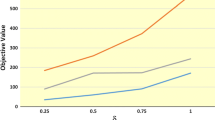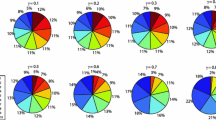Abstract
In this paper, an optimization problem with uncertain constraint coefficients is considered. Possibility theory is used to model the uncertainty. Namely, a joint possibility distribution in constraint coefficient realizations, called scenarios, is specified. This possibility distribution induces a necessity measure in a scenario set, which in turn describes an ambiguity set of probability distributions in a scenario set. The distributionally robust approach is then used to convert the imprecise constraints into deterministic equivalents. Namely, the left-hand side of an imprecise constraint is evaluated by using a risk measure with respect to the worst probability distribution that can occur. In this paper, the Conditional Value at Risk is used as the risk measure, which generalizes the strict robust, and expected value approaches commonly used in literature. A general framework for solving such a class of problems is described. Some cases which can be solved in polynomial time are identified.




Similar content being viewed by others
Availability of data and materials
The data that support the findings of this study are available from the corresponding authors upon request.
Code availability
Our research did not involve any code.
References
Baudrit, C., & Dubois, D. (2006). Practical representations of incomplete probabilistic knowledge. Computational Statistics and Data Analysis, 51(1), 86–108.
Ben-Tal, A., El Ghaoui, L., & Nemirovski, A. (2009). Robust optimization. Princeton series in applied mathematicsPrinceton, NJ: Princeton University Press.
Bertsimas, D., & Sim, M. (2004). The price of robustness. Operations Research, 52(1), 35–53.
Bertsimas, D., Gupta, V., & Kallus, N. (2018). Data-deriven robust optimization. Mathematical Programming, 167, 235–292.
Boyd, S., & Vandenberghe, L. (2008). Convex Optimization. Cambridge University Press.
De Cooman, G., & Aeyels, D. (1999). Supremum-preserving upper probabilities. Information Sciences, 118(1–4), 173–212.
Delage, E., & Ye, Y. (2010). Distributionally robust optimization under moment uncertainty with application to data-deriven problems. Operations Research, 58(3), 595–612.
Destercke, S., Dubois, D., & Chojnacki, E. (2009). A consonant approximation of the product of independent consonant random sets. International Journal of Uncertainty, Fuzziness and Knowledge-Based Systems, 17(6), 773–792.
Dubois, D. (2006). Possibility theory and statistical reasoning. Computational Statistics and Data Analysis, 51(1), 47–69.
Dubois, D., & Prade, H. (1978). Operations on fuzzy numbers. International Journal of Systems Science, 9, 613–626.
Dubois, D., & Prade, H. (1988). Possibility theory: an approach to computerized processing of uncertainty. Plenum Press.
Dubois, D., & Prade, H. (1992). When upper probabilities are possibility measures. Fuzzy Sets and Systems, 49(1), 65–74.
Esfahani, P. M., & Kuhn, D. (2018). Data-driven distributionally robust optimization using the Wasserstein metric: performance guarantees and tractable reformulations. Mathematical Programming, 171, 115–166.
Grötschel, M., Lovász, L., & Schrijver, A. (1993). Geometric algorithms and combinatorial optimization. Springer.
Guillaume, R., Kasperski, A., & Zieliński, P. (2023). Distributionally robust possibilistic optimization problems. Fuzzy Sets and Systems, 454, 56–73.
Inuiguchi, M., & Ramik, J. (2000). Possibilistic linear programming: A brief review of fuzzy mathematical programming and a comparison with stochastic programming in portfolio selection problem. Fuzzy Sets and Systems, 111(1), 3–28.
Kall, P., & Mayer, J. (2005). Stochastic linear programming. Models, theory and computationSpringer.
Klerk, E. D., & Laurent, M. (2019). A survey of semidefinite programming approaches to the generalized problem of moments and their error analysis. In C. Araujo, G. Benkart, C. E. Praeger, & B. Tanbay (Eds.), World women in mathematics 2018. Association for women in mathematics series (pp. 17–56). Springer.
Lai, Y.-J., & Hwang, C.-L. (1992). Fuzzy mathematical programming. Methods and applicationsSpringer.
Liu, B. (2001). Fuzzy random chance-constrained programming. IEEE Transactions on Fuzzy Systems, 9(5), 713–720.
Nemirovski, A., & Shapiro, A. (2006). Convex approximation of chance constrained programs. SIAM Journal on Optimization, 17(4), 969–996.
Pishvaee, M. S., Razmin, J., & Torabi, S. A. (2012). Robust possibilistic programming for socially responsible supply chain network design: a new approach. Fuzzy Sets and Systems, 206, 1–20.
Rockafellar, R. T., & Uryasev, S. P. (2000). Optimization of conditional value-at-risk. The Journal of Risk, 2(3), 21–41.
Troffaes, M., Miranda, E., & Destercke, S. (2013). On the connection between probability boxes and possibility measures. Information Sciences, 224, 88–108.
Vanderbei, R. J. (2014). Linear programming: foundations and extensions. New York: Springer.
Wiesemann, W., Kuhn, D., & Sim, M. (2014). Distributionally robust convex optimization. Operations Research, 62(6), 1358–1376.
Bertsimas, D., & Sim, M. (2004). Robust discrete optimization under ellipsoidal uncertainty sets. Technical report, MIT.
Guillaume, R., Kasperski, A., & Zieliński, P. (2021). Distributionally robust optimization in possibilistic setting. In 2021 IEEE International Conference on Fuzzy Systems (FUZZ-IEEE) (pp. 1–6).
Lodwick, W. A., & Kacprzyk, J. (Eds.). (2010). Fuzzy optimization—recent advances and applications studies in fuzziness and soft computing (Vol. 254). Springer.
Acknowledgements
Romain Guillaume has benefitted from the AI Interdisciplinary Institute ANITI funding. ANITI is funded by the French Investing for the Future - PIA3 program under the Grant agreement ANR-19-PI3A-0004. Adam Kasperski and Paweł Zieliński were supported by the National Science Centre, Poland, grant 2022/45/B/HS4/00355.
Funding
Romain Guillaume has benefitted from the AI Interdisciplinary Institute ANITI funding. ANITI is funded by the French Investing for the Future - PIA3 program under the Grant agreement ANR-19-PI3A-0004. Adam Kasperski and Paweł Zieliński were supported by the National Science Centre, Poland, grant 2022/45/B/HS4/00355.
Author information
Authors and Affiliations
Corresponding author
Ethics declarations
Conflict of interest
We have no conflict of interest to disclose.
Additional information
Publisher's Note
Springer Nature remains neutral with regard to jurisdictional claims in published maps and institutional affiliations.
Rights and permissions
Springer Nature or its licensor (e.g. a society or other partner) holds exclusive rights to this article under a publishing agreement with the author(s) or other rightsholder(s); author self-archiving of the accepted manuscript version of this article is solely governed by the terms of such publishing agreement and applicable law.
About this article
Cite this article
Guillaume, R., Kasperski, A. & Zieliński, P. A framework of distributionally robust possibilistic optimization. Fuzzy Optim Decis Making 23, 253–278 (2024). https://doi.org/10.1007/s10700-024-09420-2
Accepted:
Published:
Issue Date:
DOI: https://doi.org/10.1007/s10700-024-09420-2




